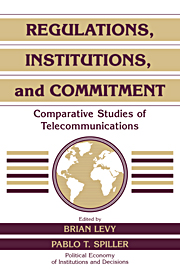Book contents
- Frontmatter
- Contents
- Foreword
- Series editor's preface
- Preface
- List of contributors
- 1 A framework for resolving the regulatory problem
- 2 Telecommunications regulation in Jamaica
- 3 The United Kingdom: A pacesetter in regulatory incentives
- 4 Chile: Regulatory specificity, credibility of commitment, and distributional demands
- 5 The political economy of the telecommunications sector in the Philippines
- 6 Argentina: The sequencing of privatization and regulation
- Notes
- References
- Index
5 - The political economy of the telecommunications sector in the Philippines
Published online by Cambridge University Press: 05 June 2012
- Frontmatter
- Contents
- Foreword
- Series editor's preface
- Preface
- List of contributors
- 1 A framework for resolving the regulatory problem
- 2 Telecommunications regulation in Jamaica
- 3 The United Kingdom: A pacesetter in regulatory incentives
- 4 Chile: Regulatory specificity, credibility of commitment, and distributional demands
- 5 The political economy of the telecommunications sector in the Philippines
- 6 Argentina: The sequencing of privatization and regulation
- Notes
- References
- Index
Summary
Policymakers the world over have come to see privatization as an important remedy for the ills afflicting economies long dominated by stateowned enterprises. Private sector involvement is expected to bring increased resources and efficiency to ailing public enterprises. Yet it is still an open question whether private enterprises can perform well in situations where public ones have failed. Indeed, many private enterprises in developing countries have track records no better than those of typical public enterprises in similar situations. What are necessary conditions for the success of the private sector in a developing economy? Certainly, it takes more than a simple transfer of ownership for a firm or industry to prosper.
The experience of the telecommunications sector in the Philippines provides an opportunity to study the underlying causes of success and failure in an infrastructure sector in which most firms have been privately owned since the industry's infancy. The main operators in the sector have had direct access to international capital markets and have managed to raise large amounts of debt capital relative to their equity, yet the sector has not performed very well: telephone density is low (about 1.7 telephone sets and 1.1 main lines per 100 people), waiting lists for basic services are long, and service quality is roundly attacked (Gavino 1992). Even taking the country's level of development into account, it seems that the sector has had no edge over its counterparts in other countries, including those under public ownership or with more restricted access to foreign capital.
- Type
- Chapter
- Information
- Regulations, Institutions, and CommitmentComparative Studies of Telecommunications, pp. 145 - 201Publisher: Cambridge University PressPrint publication year: 1996
- 6
- Cited by



